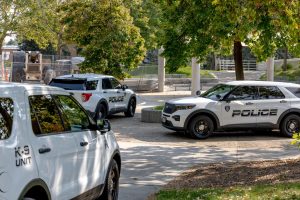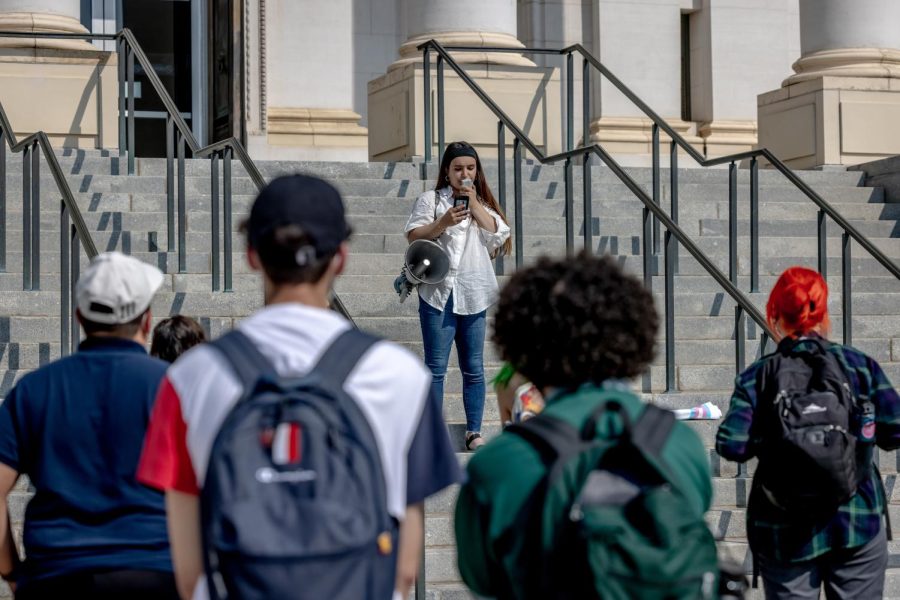Kincart: You and an Unsafe Campus
(Photo by Jack Gambassi | The Daily Utah Chronicle)
October 4, 2021
The 2019 University of Utah Annual Security and Fire Safety Report stated that 20 instances of rape, 21 instances of burglary, 18 instances of motor vehicle theft and 62 instances of stalking occurred throughout the year. The report also shows that a “murder/non-negligent manslaughter” occurred in both 2017 and 2018. Reported rapes increased by 67% between 2018 and 2019.
Even if you’ve never been one of these university statistics, you still grapple with their effects. Our friends, roommates and classmates make up those numbers — and we fear that one day we very well could, too. So, we move on and continue trying our best to block out all the terrible things on campus. Consequently, our mental health suffers and we seldom talk about it.
We should not experience this level of unsafety during our time at the U, especially when it severely strains students’ mental health. The U needs to better provide resources to help students cope with the dangers on campus.
Lack of campus safety affects us all. Thirteen percent of all students — and more specifically 26.4% of female undergraduates — fall victim to rape or sexual assault. These numbers indicate that sexual violence is likely tied to one’s undergraduate experience, if not the experience of a loved one. Also, only 20% of female student victims ages 18-24 report these crimes to law enforcement, meaning that the actual likelihood of falling victim to these atrocities is likely much higher. Because of this, we deserve to know our university’s safety statistics and the policies intended to lower them.

People may point to police protection as a potential solution. However, students grow concerned in situations where police force is used, especially since campus police have a bad track record. The death of Lauren McClusky solidified students’ weariness of UUPD — and nothing since has bettered the relationships between them and the students. Although UUPD will move towards wearing body cameras, people should address concerns about privacy.
According to UnsafeU’s Aug. 9 Instagram post, “indefinite storage of video related to rape and sexual assaults creates concerns regarding [the] privacy of victims and survivors in their most vulnerable moments. This may also deter IPV, rape, and sexual assault reporting.” Despite attempts to make campus safer, campus police increase the stress students face when deciding whether to report a crime.
Research shows that law enforcement interactions increase stress among civilians. These interactions could also hinder someone’s ability to cope with and move on from those crimes. According to a recent study, “power inequities in state-sanctioned violence,” “police culture[s that] deter internal accountability,” “perceived racial and class bias” and “use of/access to weapons” amount to recognition as concerns for health. The U’s attempts to make campus safer through police use are ineffective because of policing’s mental health implications.
The U should increase campus safety through nonviolent measures. Campus police should stay the same, or if anything, their role should be minimized. Even the “visible presence of armed officers on campus” can stress students out because they may “come from communities where police are viewed as more threatening than helpful.”
The U needs to acknowledge the strain they have put on mental health. Making a statement about this reality would not only break the stigma associated with mental health but would also amplify student voices. Acknowledgment of the undue stress we as students endure because of the lack unsafety on campus would go far in improving the mental health culture here at the U.
The U continually hurts our mental health and leaves us without sufficient resources to grapple with their decisions. We face enough academic pressures related to success and the rising cost of college. We need to unpack what campus unsafety does to our mental health, too. When I park my car on campus at night and walk back to my dorm, I call a friend until I make it inside. I’m only now understanding that I have a legitimate fear of what could happen to me on this campus — and that fear has only worsened my mental health. I know I’m not the only one.
As we process how this issue affects all students, the U should do better to listen to our voices. Until things change substantially, we need to help each other work through the terrors of this experience. Our experiences are real, valid, and we must take action.









